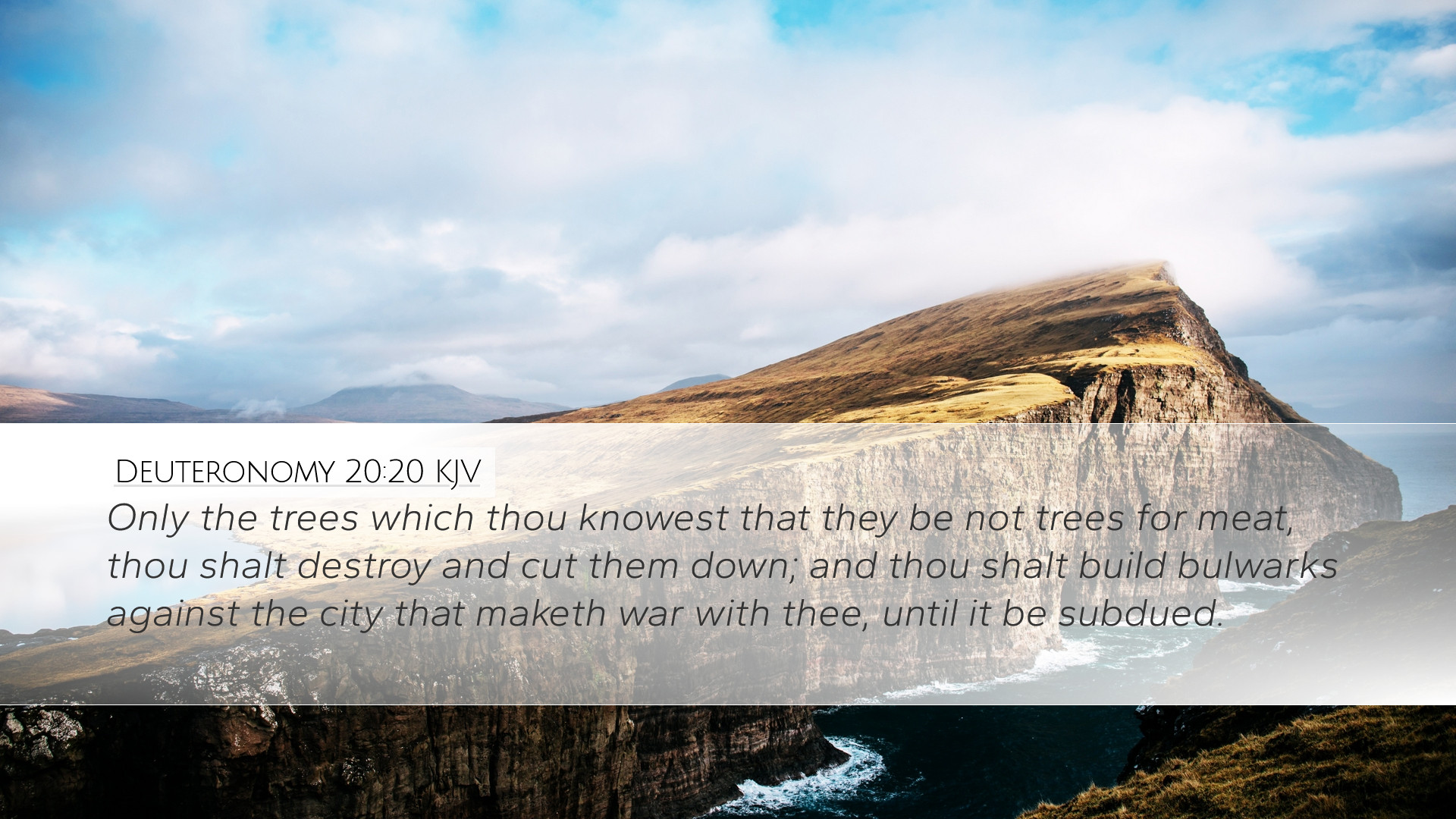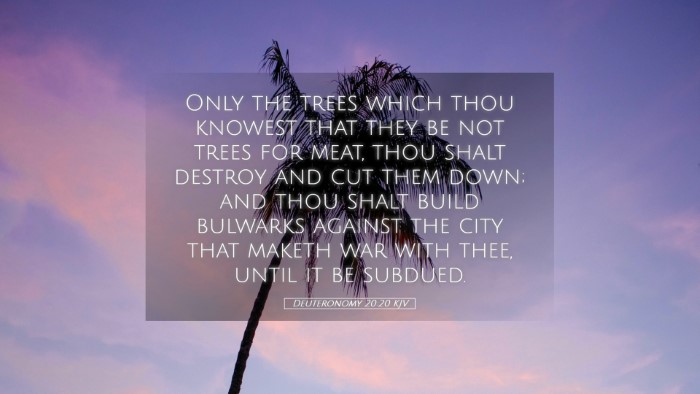Commentary on Deuteronomy 20:20
Bible Verse (Deuteronomy 20:20): "Only the trees which thou knowest that they be not trees for meat, thou shalt destroy and cut them down; and thou shalt build bulwarks against the city that maketh war with thee, until it be subdued."
Introduction
This verse is part of a broader discourse given by Moses to the Israelites concerning the laws related to warfare and conquest. The context of this instruction highlights God's providential care over His people during their entrance into the Promised Land, as well as the need to act with discernment and sustainability even in times of conflict. This commentary is based on the insights from respected public domain scholars, including Matthew Henry, Albert Barnes, and Adam Clarke.
Contextual Analysis
Moses, as he prepares the Israelites for warfare, emphasizes the importance of strategic decision-making when engaging in conflict. The command to identify trees that are not for food before being destroyed reflects not only a tactical consideration but also an underlying principle of preservation and responsibility towards the environment.
Moral and Ethical Ramifications
- Preservation of Resources: Henry notes that even in war, God requires His people to be wise stewards of their resources. Cutting down trees that bear sustenance would be a direct detriment to the community in the future.
- Assessment and Judgment: Barnes highlights the necessity of discernment in identifying which trees to destroy. This requires a level of engagement with the environment and a commitment to understanding the broader ecological impact of such actions.
- God’s Care for Creation: Clarke emphasizes that God's concern extends into the minutiae of life. This directive underscores a theological perspective that values creation and encourages caring for the land.
Theological Insights
The theological implications of Deuteronomy 20:20 can be profound. The verse illustrates that God desires His people to act justly and wisely, even amidst the chaos of war. The act of deciding which trees to cut down symbolizes a deeper responsibility towards creation.
God's Sovereignty in Warfare
God's involvement in the battles faced by the Israelites is evident throughout this passage. Henry points out that reliance on divine support was crucial for victory. By instructing the Israelites on the management of resources, God is not merely focused on their immediate survival but also on their long-term prosperity.
Human Responsibility and Stewardship
Stewardship is a recurring theme in the Bible. Barnes articulates that humans are stewards of God’s creation, tasked with caring for it responsibly. This verse calls for an evaluation of how resources are used, suggesting a responsible approach to warfare that prioritizes sustainability.
Contrast with Pagan Practices
In the ancient context, it was common for conquering nations to ravage the land indiscriminately. Clarke contrasts this Israelite directive with the practices of surrounding nations, highlighting that Israel was called to a higher standard of ethics, grounded in their covenant relationship with God.
Practical Applications
The lessons drawn from Deuteronomy 20:20 extend beyond ancient warfare into the ethical conduct of modern believers. Here are several applications for contemporary faith communities:
- Environmental Awareness: This text encourages a commitment to ecological sustainability. Pastors and leaders can use this passage to address modern environmental issues, advocating for responsible stewardship of God’s creation.
- Wise Decision-Making: Congregations are reminded to be prudent in their decisions, particularly in conflict situations. Emphasizing the need for discernment can guide pastoral counseling and community decisions.
- Covenantal Relationships: This verse can be utilized to teach about the importance of recognizing one’s responsibility in relationships—both with God and with creation, fostering an ethic of care and respect.
Conclusion
Deuteronomy 20:20 serves as a profound reminder of the delicate balance required in times of conflict. This passage invites deep reflection on not only the immediate implications for warfare but also broader themes of stewardship, moral responsibility, and the sovereignty of God. In light of insights from Henry, Barnes, and Clarke, modern readers—whether pastors, theologians, or students—are encouraged to engage with the text meaningfully, drawing forth its rich theological and practical significance for today’s world.


